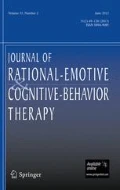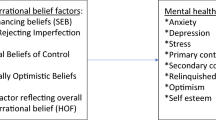Abstract
The current study focuses on the protective role of rational beliefs in the relationship between irrational beliefs and negative emotional states (stress, depression and anxiety) in a sample of Turkish undergraduate students (N = 440). The findings suggest that irrational beliefs, especially the need for achievement, the need for approval, and the need for comfort, are important predictors of negative emotional states (stress, depression, and anxiety). The findings also provide additional evidence for the protective role of rational beliefs. Findings suggest that rational beliefs have a moderator role in the relationship between irrational beliefs and negative emotional states (stress, depression and anxiety). Contributions and the implications of this study were discussed in detail.

Similar content being viewed by others
References
Bernard, M. E. (1990, June). Validation of General Attitude and Belief Scale. Presented at the World Congress of Mental Health Counselling, Keystone, CO.
Bernard, M. E. (1998). Validation of General Attitude and Belief Scale. Journal of Rational-Emotive & Cognitive-Behavior Therapy, 16, 183–196.
Bilgel, N., & Bayram, N. (2010). Turkish version of the Depression Anxiety Stress Scale (DASS-42): Psychometric properties. Archives of Neuropsychiatry/Nöropsikiatri Arşivi, 47(2), 118–126.
Burgess, P. (1986). Belief systems and emotional disturbance: Evaluation of the rational emotive model. Unpublished doctoral dissertation, University of Melbourne, Parkville, Melbourne, Australia.
Caserta, D. A., Dowd, E. T., David, D., & Ellis, A. (2010). Rational and irrational beliefs in primary prevention and mental health. In D. David, S. J. Lynn, & A. Ellis (Eds.), Rational and irrational beliefs: Research, theory and clinical practice (pp. 173–194). New York: Oxford University Press.
Chamberlain, J. M., & Haaga, D. A. (2001). Unconditional self-acceptance and responses to negative feedback. Journal of Rational-Emotive & Cognitive-Behavior Therapy, 19(3), 177–189.
Chang, E. C., & D’Zurilla, T. J. (1996). Irrational beliefs as predictors of anxiety and depression in a college population. Personality and Individual Differences, 20(2), 215–219.
Cohen, J. (1988). Statistical power analysis for the behavioral sciences (2nd ed.). Hillsdale, NJ: Erlbaum.
Culhane, S. E., & Watson, P. J. (2003). Alexithymia, irrational beliefs, and the rational-emotive explanation of emotional disturbance. Journal of Rational-Emotive and Cognitive Behavior Therapy, 21, 57–73.
David, D., Lynn, S. J., & Ellis, A. (2010). The role of rational and irrational beliefs in human functioning and disturbances: Implications for research, theory, and clinical practice. Oxford: Oxford University Press.
David, D., Montgomery, G. H., Macavei, B., & Bovbjerg, D. H. (2005). An empirical investigation of Albert Ellis’s binary model of distress. Journal of Clinical Psychology, 61(4), 499–516.
DiGiuseppe, R., Leaf, R., Exner, T., & Robin, M. V. (1988, September). The development of a measure of rational/irrational thinking. Paper presented at the World Congress of Behavior Therapy, Edinburgh, Scotland.
DiGiuseppe, R., Leaf, R., Gorman, B., & Robin, M. W. (2017). The development of a measure of irrational/rational beliefs. Journal of Rational-Emotive & Cognitive-Behavior Therapy. https://doi.org/10.1007/s10942-017-0273-3.
Dryden, W., & Branch, R. (2008). The fundamental of rational emotive behavior therapy. London: Wiley.
Ellis, A. (1994). Reason and emotion in psychotherapy (2nd ed.). Secaucus, NJ: Birscj Lane.
Ellis, A. (2003a). Differentiating preferential from exaggerated and musturbatory beliefs in rational emotive behavior therapy. In W. Dryden (Ed.), Rational emotive behavior therapy: Theoretical developments (pp. 22–34). New York: Brunner Routledge.
Ellis, A. (2003b). Discomfort anxiety: A new cognitive-behavioral construct (part I). Journal of Rational-Emotive & Cognitive-Behavior Therapy, 21(3–4), 183–191.
Ellis, A., & Dryden, W. (1997). The practice of rational emotive behavior therapy. New York: Springer.
Hayes, A. F. (2013). Introduction to mediation, moderation, and conditional process analysis. A regression-based approach. New York, NY: Guilford.
Hutchinson, G. T., Patock-Peckham, J. A., Cheong, J., & Nagoshi, C. T. (1998). Irrational beliefs and behavioral misregulation in the role of alcohol abuse among college students. Journal of Rational-Emotive & Cognitive-Behavior Therapy, 16(1), 61–74.
Hyland, P., Shevlin, M., & Adamson, G. (2014). The moderating role of irrational beliefs in the relationship between irrational beliefs and posttraumatic stress symptomology. Behavioural and Cognitive Psychotherapy, 42, 312–326.
Lovibond, P. F., & Lovibond, S. H. (1995). The structure of negative emotional states: Comparison of the Depression Anxiety Stress Scales (DASS) with the Beck Depression and Anxiety Inventories. Behaviour Research and Therapy, 33(3), 335–343.
Mayhew, R., & Edelmann, R. J. (1989). Self-esteem, irrational beliefs and coping strategies in relation to eating problems in a non-clinical population. Personality and Individual Differences, 10(5), 581–584.
Mertler, C. A., & Reinhart, R. V. (2017). Advanced and multivariate statistical methods: Practical application and interpretation (6th ed.). Third Avenue, NY: Routledge.
Oltean, H. R., Hyland, P., Vallières, F., & David, D. O. (2017). An empirical assessment of REBT models of psychopathology and psychological health in the prediction of anxiety and depression symptoms. Behavioural and Cognitive Psychotherapy. https://doi.org/10.1017/S1352465817000133.
Popov, B., & Popov, S. (2013). Adverse working conditions, job insecurity and occupational stress: The role of (ir) rational beliefs. Journal of Rational-Emotive & Cognitive-Behavior Therapy, 31(1), 27–38.
Schnur, J. B., Montgomery, G. H., & David, D. (2010). Irrational and rational beliefs and physical health. In D. David, S. J. Lynn, & A. Ellis (Eds.), Rational and Irrational beliefs: Research, theory and clinical practice (pp. 253–264). New York: Oxford University Press.
Scott, J. (2007). The effect of perfectionism and unconditional self-acceptance on depression. Journal of Rational-Emotive & Cognitive-Behavior Therapy, 25(1), 35–64.
Szentagotai, A. (2006). Irrational beliefs, thought suppression and distress—A mediation analysis. Journal of Cognitive & Behavioral Psychotherapies, 6(2), 119–127.
Szentagotai, A., & Jones, J. (2010). The behavioral consequences of irrational beliefs. In D. David, S. J. Lynn, & A. Ellis (Eds.), Rational and irrational beliefs: Research, theory and clinical practice (pp. 75–197). New York: Oxford University Press.
Vîslă, A., Flückiger, C., Grosse Holtforth, M., & David, D. (2016). Irrational beliefs and psychological distress: A meta-analysis. Psychotherapy and Psychosomatics, 85(1), 8–15.
Ziegler, D. J., & Leslie, Y. M. (2003). A test of the ABC model underlying rational emotive behavior therapy. Psychological Reports, 92(1), 235–240.
Author information
Authors and Affiliations
Corresponding author
Ethics declarations
Conflict of interest
The authors declare no conflicts of interest with respect to the research, authorship, and/or publication of this article.
Ethical Approval
All procedures performed in studies involving human participants were in accordance with the ethical standards of Social and Human Sciences Research and Publication Ethics Committee of Pamukkale University (Approval Number: 68282350/2007/G05).
Informed Consent
Informed consent was obtained from each participant.
Rights and permissions
About this article
Cite this article
Balkıs, M., Duru, E. The Protective Role of Rational Beliefs on the Relationship Between Irrational Beliefs, Emotional States of Stress, Depression and Anxiety. J Rat-Emo Cognitive-Behav Ther 37, 96–112 (2019). https://doi.org/10.1007/s10942-018-0305-7
Published:
Issue Date:
DOI: https://doi.org/10.1007/s10942-018-0305-7




